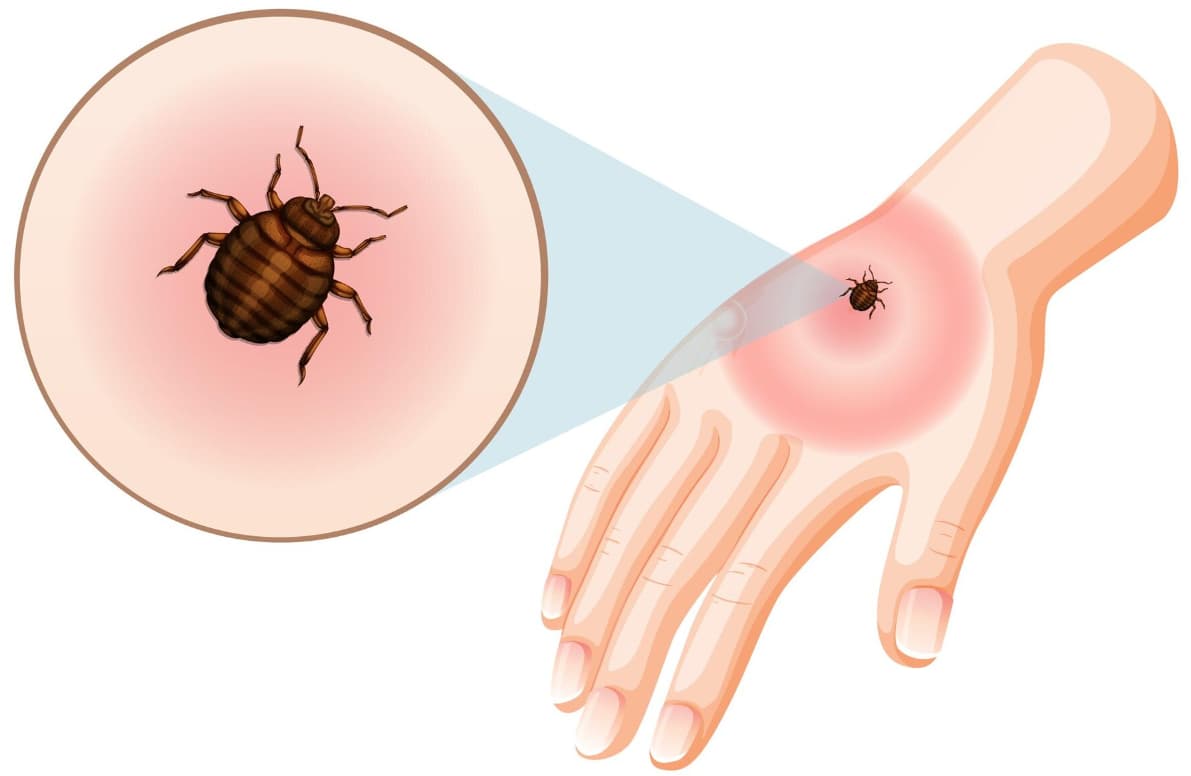Ticks are tiny pests that can cause big problems.
These little bloodsuckers hang out in yards and woods, waiting to latch onto people and pets. Once they bite, ticks can spread nasty diseases. Nobody wants these creepy crawlers in their yard!
The good news is there are lots of ways to kick ticks to the curb.
How to Get Rid of Ticks from Yard?

In this guide, we’ll go over 9 expert tips to get rid of ticks and keep them away for good.
You’ll learn how to make your yard less tick-friendly and use safe methods to say bye-bye to these pesky bugs.
Let’s dive in and learn how to take back your outdoor space from ticks!
Top 9 Expert Tips for Getting Rid of Ticks in Your Yard
Solution #1: Keep a Tidy Yard
One of the best ways to keep ticks away is to keep your yard neat and clean. Ticks love messy, overgrown areas where they can hide. By tidying up, you make your yard much less inviting for ticks.
Here are some key yard clean-up tasks that help deter ticks:
- Remove leaf litter: Rake up fallen leaves and get rid of them. Don’t let piles of leaves sit around.
- Clear brush: Trim back overgrown bushes and clear out dense vegetation.
- Pick up yard debris: Don’t let piles of sticks, branches, or grass clippings build up.
- Store firewood neatly: Stack firewood in a dry area away from your house.
- Keep play areas clear: Make sure kids’ play areas are free of brush and debris.
A clean yard doesn’t just look nice – it helps keep ticks and other pests away.
Ticks need moisture and shade to survive. By removing their hiding spots, you make life harder for them.
Cleaning up also gets rid of places where tick-carrying animals like mice and rats like to live. Fewer rodents means fewer ticks!
Make yard clean-up a regular habit. A quick pick-up each week can go a long way in tick prevention.
Get the whole family involved to make it easier.
Solution #2: Mow Frequently
Ticks love to hang out in tall grass. It gives them shade and a place to wait for hosts to walk by.
That’s why keeping your lawn mowed short is so important for tick control.
How short should you mow? Experts say 3 inches or less is ideal.
This length is too short for ticks to hide, but still healthy for your grass.
Here are some lawn-mowing tips to deter ticks:
- Mow at least once a week during the growing season
- Don’t let the grass get taller than 3-4 inches
- Bag grass clippings instead of leaving them on the lawn
- Mow to the edge of your property line
- Trim around fences, trees, and landscaping
Mowing regularly does more than just keep ticks away. It also:
- Makes your yard look nicer
- Prevents weeds from taking over
- Keeps your grass healthy
If mowing feels like a chore, try to make it fun. Put on some music or a podcast while you work. Or make it a family activity and take turns pushing the mower.
Don’t have time to mow often? Consider hiring a lawn service. The cost is worth it to keep ticks at bay.
Remember, consistent mowing is key. Don’t let your grass get out of control, even for a week or two. Ticks can move in fast when grass gets tall!
Solution #3: Build a Tick Defense Barrier
Creating a physical barrier is a great way to keep ticks out of your yard.
This method is especially helpful if you live near wooded areas where ticks are common.
A tick barrier is pretty simple. It’s just a strip of material that ticks don’t like to cross.
You put this strip around the edge of your yard to block ticks from entering.
Here are some materials you can use to make a tick barrier:
- Wood chips
- Gravel
- Mulch
- Sand
Aim to make your barrier at least 3 feet wide. This width makes it hard for ticks to cross without drying out.
Steps to build a tick barrier:
- Decide where you want your barrier. Usually, this is along the edge of your yard where it meets woods or tall grass.
- Clear the area of grass and weeds.
- Lay down landscape fabric to prevent weeds from growing through your barrier.
- Add your chosen material (wood chips, gravel, etc.) in a 3-foot wide strip.
- Maintain the barrier by adding more material as needed and keeping it weed-free.
You can also add a physical fence to your barrier. This helps keep out larger animals that might carry ticks into your yard.
A tick barrier takes some work to set up, but it’s very effective. It’s a one-time project that can provide years of tick protection.
Solution #4: Use Chemical Treatments
Sometimes, natural methods aren’t enough to control a tick problem.
In these cases, chemical treatments can be a good option. These products kill ticks quickly and can provide long-lasting protection.
There are several types of chemical tick treatments:
- Sprays: These cover a large area and kill ticks on contact.
- Granules: You spread these on your lawn and water them in.
- Tick tubes: These target ticks on mice, a common tick host.
When choosing a chemical treatment, look for products with these active ingredients:
- Permethrin
- Bifenthrin
- Deltamethrin
These chemicals are effective against ticks but relatively safe when used correctly.
Here’s how to use chemical tick treatments safely:
- Read the label: Follow all instructions carefully.
- Wear protective gear: Use gloves and long sleeves when applying.
- Keep pets and kids away: Don’t let them in treated areas until it’s safe.
- Apply at the right time: Treat in spring when ticks are most active.
- Reapply as needed: Most treatments need to be repeated every few months.
Remember, chemical treatments should be a last resort. Try natural methods first. If you do use chemicals, use them responsibly to protect yourself and the environment.
Solution #5: Use Natural Repellents
If you prefer to avoid chemicals, there are many natural ways to repel ticks.
These methods are safe for kids and pets and better for the environment.
Here are some natural tick repellents to try:
- Essential Oils
Certain essential oils smell bad to ticks. Mix these oils with water in a spray bottle and apply to your yard:
- Lavender oil
- Peppermint oil
- Lemon eucalyptus oil
- Citronella oil
- Tea tree oil
Use about 20 drops of oil per cup of water. Spray around your yard, focusing on tick-prone areas.
- Diatomaceous Earth
This natural powder is made from tiny fossilized algae. It’s sharp at a microscopic level and cuts through ticks’ exoskeletons, drying them out.
Sprinkle food-grade diatomaceous earth around your yard, especially in shady areas.
- Neem Oil
Neem oil comes from a tree and acts as a natural pesticide. Mix 1 ounce of neem oil with 1 gallon of water. Spray this mixture on plants and soil in your yard.
- Garlic Spray
Ticks hate the smell of garlic. Blend a few cloves of garlic with water and strain. Add this to a spray bottle and apply it around your yard.
These natural methods may need to be applied more often than chemical treatments.
But they’re a great option if you want to avoid harsh pesticides.
Solution #6: Add Tick-Repelling Plants
Believe it or not, some plants naturally keep ticks away. Adding these to your yard can help create a tick-free zone. Plus, many of these plants look and smell great!
Here are some top tick-repelling plants:
- Lavender: Its strong scent repels ticks and other insects.
- Chrysanthemums: These flowers contain pyrethrin, a natural insecticide.
- Marigolds: Their strong smell keeps ticks and other pests away.
- Mint: All types of mint repel ticks. Just be careful – it spreads easily!
- Sage: This herb has a strong scent that ticks don’t like.
- Rosemary: Another fragrant herb that ticks avoid.
- Garlic: Plant garlic around the edges of your yard to create a tick barrier.
How to use tick-repelling plants:
- Plant them around the edges of your yard.
- Put them near seating areas and play areas.
- Use them to create a border around your garden.
- Grow them in pots on your patio or deck.
Remember, while these plants help, they’re not a complete solution. Use them along with other tick control methods for best results.
Solution #7: Attract Tick Predators
Nature has its way of controlling tick populations. Many animals eat ticks as part of their diet.
By making your yard friendly to these animals, you can get free tick control!
Here are some tick-eating animals to attract:
Birds
Many birds love to snack on ticks. Here are some tick-eating birds:
- Robins
- Bluebirds
- Chickadees
- Wild turkeys
To attract birds:
- Put up bird feeders
- Install bird baths
- Plant native plants that produce berries
Chickens
If you’re able to keep backyard chickens, they’re great for tick control. Chickens scratch in the dirt and eat any ticks they find.
Opossums
These odd-looking creatures are tick-eating machines. A single opossum can eat thousands of ticks in one season! To attract opossums:
- Leave out pet food at night
- Provide water sources
- Create brush piles for shelter
Guinea Fowl
These birds are like chicken cousins. They roam yards eating ticks and other insects. You can raise them like chickens if your area allows it.
Remember, attracting wildlife means you might see more animals in your yard. Make sure you’re okay with that before using this method.
Solution #8: Let the Sun Shine
Ticks love shady, damp areas. By letting more sunlight into your yard, you make it less tick-friendly. This method is simple but very effective.
Here’s how to increase sunlight in your yard:
- Trim trees: Cut back branches that create too much shade.
- Thin out bushes: Remove some branches to let light through.
- Remove unnecessary plants: Take out plants that block sunlight from your lawn.
- Keep grass short: Short grass lets more sun reach the soil.
- Clear leaf litter: Rake up leaves that block the sun from the ground.
Benefits of a sunnier yard:
- Dries out soil: Ticks need moisture to survive. Sunlight dries the soil, making it less hospitable.
- Kills ticks directly: UV rays from the sun can kill ticks.
- Improves plant health: Most plants grow better with more sun, creating a healthier yard.
- Reduces other pests: Many pests besides ticks prefer shade.
When increasing sunlight, be careful not to overdo it. Some shade is good for your yard and helps conserve water. Aim for a balance of sunny and shady areas.
Solution #9: Hire a Professional
Sometimes, despite your best efforts, ticks can still be a problem. In these cases, it might be time to call in the experts.
Professional pest control services have tools and knowledge that can tackle even the toughest tick infestations.
Here’s what to expect when you hire a pro:
- Inspection: They’ll check your entire yard for tick hot spots.
- Treatment plan: Based on the inspection, they’ll create a custom plan.
- Application: They’ll use professional-grade products to kill and repel ticks.
- Follow-up: Most services include repeat visits to ensure ticks stay away.
Benefits of professional tick control:
- Expertise: Pros know exactly where to look for ticks and how to treat them.
- Stronger products: They have access to more powerful treatments than you can buy.
- Time-saving: No need to spend your weekends battling ticks.
- Peace of mind: You know your yard is being handled by experts.
When choosing a pest control service:
- Look for companies that specialize in tick control.
- Check reviews and ask for references.
- Make sure they use safe, eco-friendly methods when possible.
- Ask about guarantees or warranties on their work.
Professional help can be pricey, but it’s often worth it for severe tick problems. If you’ve tried other methods without success, don’t hesitate to call in the pros.
FAQs About Getting Rid of Ticks
- Q: How do I know if I have ticks in my yard?
A: Look for these signs:
- Seeing ticks on pets after they’ve been outside
- Finding ticks on yourself after yard work
- Noticing an increase in mice or other small animals
- Spotting ticks crawling on grass or leaves
You can also do a “tick drag” by pulling a white cloth over your lawn. If there are ticks, they’ll grab onto the cloth.
- Q: What time of year are ticks most active?
A: Ticks are most active in spring and early summer. However, they can be a problem any time temperatures are above freezing. In warmer climates, ticks may be active year-round.
- Q: Can ticks live in short grass?
A: While ticks prefer tall grass, they can survive in short grass too. They’re just less likely to thrive there. Keeping your grass short makes your yard less attractive to ticks, but it doesn’t eliminate them.
- Q: Are all ticks dangerous?
A: Not all ticks carry diseases, but many do. It’s best to treat all ticks as potential health risks. Common tick-borne diseases include Lyme disease, Rocky Mountain spotted fever, and ehrlichiosis.
- Q: How do I safely remove a tick?
A: If you find a tick on yourself or a pet:
- Use fine-tipped tweezers to grasp the tick as close to the skin as possible.
- Pull upward with steady pressure. Don’t twist or jerk.
- After removing, clean the bite area with soap and water or alcohol.
- Dispose of the tick by flushing it down the toilet or putting it in alcohol.
- Q: Can I use regular bug spray to repel ticks?
A: Some insect repellents work on ticks, but not all. Look for products containing DEET, picaridin, IR3535, oil of lemon eucalyptus, para-menthane-diol, or 2-undecanone. These are effective against ticks.
- Q: Will mulch in my garden attract ticks?
A: It depends on the type of mulch. Wood chips or bark mulch can attract ticks because they retain moisture. However, dry mulches like gravel or rubber mulch are less appealing to ticks.
- Q: How often should I treat my yard for ticks?
A: This depends on the method you’re using. Natural repellents might need to be applied weekly. Chemical treatments usually last 1-3 months. Professional treatments often protect for several months.
- Q: Can ticks survive the winter?
A: Yes, many tick species can survive winter. They become dormant in very cold weather but can become active again during warm spells. Some ticks even stay active under snow cover.
- Q: Are there any plants that attract ticks?
A: Ticks themselves aren’t attracted to specific plants. However, they’re often found on plants that attract their animal hosts. Japanese barberry, for example, is known to harbor more ticks because mice like to live in it.
Also Learn:
Conclusion:
Ticks may be tiny, but they can cause big problems. Luckily, there are many ways to keep these pests out of your yard. From simple yard clean-up to professional treatments, you have lots of options.
Remember, the key to tick control is persistence. Use a combination of methods and stick with them. It might take some time, but you can create a tick-free zone in your yard.
Here’s a quick recap of our 9 expert tips:
- Keep your yard tidy
- Mow your lawn frequently
- Build a tick barrier
- Use chemical treatments if needed
- Try natural repellents
- Plant tick-repelling plants
- Attract tick predators
- Let more sunlight into your yard
- Hire a professional if necessary
By following these tips, you can enjoy your outdoor space without worrying about ticks. Stay safe, have fun, and keep those ticks away!










